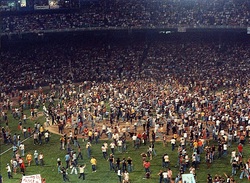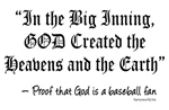
A little back round on the what led to the night. Longtime MLB owner Bill Veeck was known as being the master of promotions. Over the course of his earlier days as owner of the Cleveland Indians and St Louis Browns, Veeck had run a midget onto the field as well as taking a chance at possibility of embarrassing a legend of the Negro Leagues. Despite the fact that the signing of Satchel Paige worked out, there was a fear that Paige may have been past his prime. Though much of the blame, deservedly so, was put on Veeck, it was his son Mike who had come up with the idea. Mike was in charge of promotions for the White Sox and would pay for the idea by never getting a job in major league baseball after he resigned in 1980.
The outrage over disco was common around that time. While disco was still a big hit, there were a fair amount of those who thought disco was a threat to rock and roll. As the history of music had continued to change, the disco format had taken over many of the top radio stations throughout the country. Another element was the element of racism and sexual orientation, but I blame neither the first statement or the second.
I put the most of the blame on the bitter Steve Dahl. This angry, vengeful young man had lost his job on a local Chicago radio station. This happened due to the station changing from a rock format to disco, something that Dahl refused to conform to. Dahl would later be held responsible for violent acts and arranging events which led to disruption and arrests. Perhaps this was not the man for the Veecks to trust to put at the head of an event like this. Dahl was an evil man, who had little interest in human life. He had a bone to pick with disco, what he blames for losing his job.
The expectations for the amount of people attending were low. The White Sox had just had a little over 15,000 people in a stadium that seats about 47,000. Bill Veeck was quoted as saying he'd be happy to have about 20,000 for what was to be a single admission double header. An earlier promotion allowed for teanagers to get half priced tickets. The new one, aimed at the demolition of disco records, allowed anybody coming to the stadium with a disco record to receive a ticket for just 98 cents. A report says there could have been as many as 90,000 people either in the stadium or on the outside waiting or trying to get in. The original box (to be ignited in between games of the doubleheader) ended up being overfilled quickly and fans began to bring the records into the stadium and to their seats. The stadium security, not equipped to handle this many fans, was needed at the gates to keep unruly fans for entering the stadium after it was above capacity.
During the first game, there were incidents which forced the game to be delayed several times. Tigers fielders wore batting helmets to protect themselves from flying debris. After the first game ended, there was a chance to at least attempt to restore order. But as Dahl, the bitter loser he was, ignited the box of records, the fans rioted onto the field. This had to be expected and was probably to the delight of the evil Steve Dahl. The result was the worst on field display of violence and looting possibly in the history of the game. Pleas from Veeck, Harry Caray and others were ignored. It was said later by Veeck, as well as others, that "These were not baseball fans", which was the understatement of the day. The choice was finally made by American League President Lee McPhail to forfeit the second game to the Tigers. (The score was declared 9-0, I have no idea how that was determined.)
In spite of the night being an absolute disaster, it has to be considered the most successful promotion in the history of major league baseball. Simply because of the crowd it drew, but it was certainly not an authentic crowd. Odds were there were few people there that attended solely to watch a baseball game. Many had no interest in the game at all. And it is not like the fans came in disguise. They should have increased security and ultimately not let off the explosion of the disco records between games. But, now that it has happened, we can just look back at one of the most amazing moments in baseball history, 34 years ago.

 RSS Feed
RSS Feed
